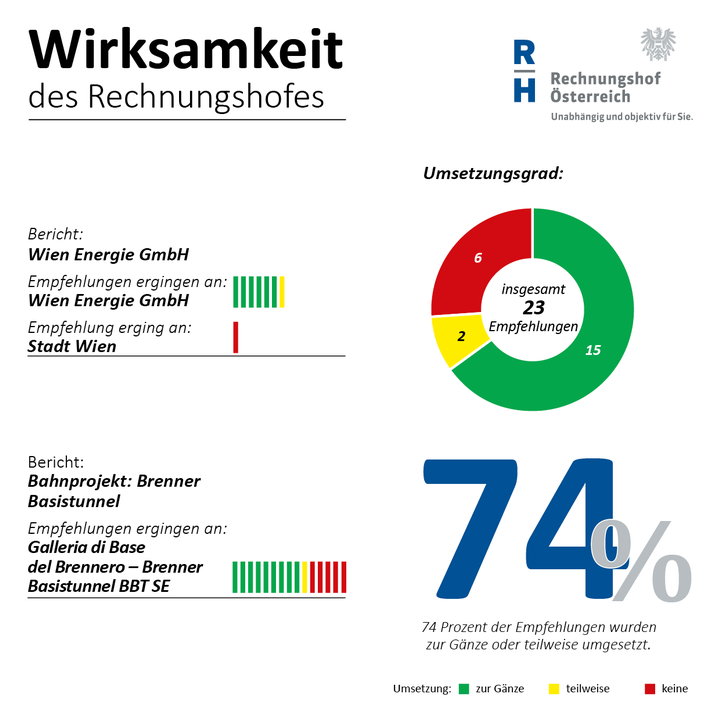The ACA creates an impact: three-quarters of its recommendations were implemented

Today, the Austrian Court of Audit (ACA) published these follow-up audit reports: Railway Project: Brenner Base Tunnel" and "WIEN ENERGIE GmbH" (in German). The reports show that the ACA creates an impact: three-quarters of the assessed recommendations were implemented fully or in part.
Date for putting into service the Brenner Base Tunnel could be delayed until 2030
Due to delays in the construction programme, the completion of the Brenner Base Tunnel could further drag on. This is highlighted by the ACA’s auditors in the follow-up audit report published today on the Brenner Base Tunnel railway project.
Some of the key reasons behind that are differing positions of the Italian and Austrian railways on railway equipment. The construction programmes of 2016 and 2018 had not been approved by the supervisory council. The approved construction programme of 2019 showed that the Italian-Austrian project company Galleria di Base del Brennero - Brenner Basistunnel BBT SE (BBT SE) had postponed the planned commissioning of the Brenner Base Tunnel from end-2027 to end-2028.
The ACA points out the following: should the risks regarding the shell construction, the equipment and the commissioning become imminent, the date for putting the tunnel into service could be delayed to early 2030. Further possible delays resulting from the COVID-19 pandemic were not taken into account since the audit was carried out before the outbreak of the pandemic. According to the initial plans, the tunnel should have been put into service in end-2026.
The ACA recommends to the BBT SE to swiftly create an agreement between the stakeholders with regard to the key requirements of the railway equipment. This is to prevent possible further delays of the completion date and possible additional costs. Furthermore, the ACA renewed its recommendation to ensure long-term financial planning. This would be key to the necessary financial security of the project. At the time of the follow-up audit in 2019, the BBT SE continued to draft only one-year financial plans.
The auditors positively noted that the BBT SE could reduce the planned costs for the shell construction from EUR 5.355 billion by EUR 0.609 billion. The reduction was also possible because the BBT SE had implemented the knowledge and personnel transfer according to the ACA’s recommendation.
WIEN ENERGIE GmbH could implement the efficiency programme
In its preceding report, the ACA had recommended to WIEN ENERGIE GmbH, the supplier of electricity, natural gas and heating in the Vienna metropolitan area, to speedily implement its efficiency programme “E17” after it had fallen into delay. The follow-up audit shows: with an improvement by EUR 87 million, WIEN ENERGIE GmbH had even slightly surpassed its goal to improve its result compared to 2013 by EUR 86 million by end-2017. About 50 per cent of the improvement was due to an increase in revenue, one third to lower costs and one fifth to personnel savings. The target headcount could be attained.
The ACA critically notes that the city of Vienna failed to sustainably solve the pension-related issue. WIEN ENERGIE GmbH still had to bear the personnel and pension expenditure of the employees assigned to it by the city of Vienna. The pension payments continue to affect the company’s liquidity.
- pdf Datei:
- 1,326.2 KB
- Umfang:
- 38 Seiten
Report: Railway Project: Brenner Base Tunnel; Follow–up Audit (in German)
- pdf Datei:
- 686.2 KB
- Umfang:
- 30 Seiten


